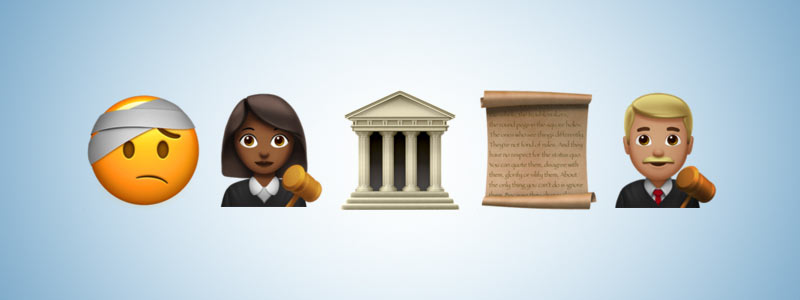Can Emojis Affect My Personal Injury Claim?
Attorneys find evidence for personal injury cases in a myriad of places. Pictures from the scene, eyewitness statements, and police reports can all play a role. Social media is one form of evidence that is increasingly taking over the courtroom. It’s never a good idea to post about your car accident on social media. Unfortunately, […]

March 26, 2018
Attorneys find evidence for personal injury cases in a myriad of places. Pictures from the scene, eyewitness statements, and police reports can all play a role. Social media is one form of evidence that is increasingly taking over the courtroom.
It’s never a good idea to post about your car accident on social media. Unfortunately, if you’ve already posted about it, it’s an even worse idea to delete it. The court may interpret deleted social media posts as an attempt to destroy evidence.
But the way we communicate on social media is very different from the way we communicate face to face. How do the courts handle the language of the Internet? How do they interpret emoticons and emojis?
Interpreting Emoticons

One of the most difficult forms of Internet language to decipher is the emoji or emoticon. Emoticons are strings of keyboard characters that depict human faces. Far from a new phenomenon, Carnegie Mellon professor Dr. Scott Fahlman invented emoticons more than 35 years ago. On September 19, 1982, Fahlman sent the following message (quotation marks added):
I propose the following character sequence for joke markers
“:-)”
Read it sideways. Actually, it is probably more economical to mark things that are NOT jokes, given current trends. For this, use:
“:-(“
Emoticons are simple to define because they consist of such simple keyboard characters. But just because the faces are easy to define doesn’t mean their meaning is clear.
For example, last spring, a U.S. district judge in Michigan had to determine the meaning of “:-P.” The definition is clear: It’s a person sticking their tongue out. But what does this emoticon actually mean? To determine that, the judge would have to look at the context of its usage as well as the cultural connotations associated with the symbol.
The tongue-sticking-out emoticon has a connotation of silliness or jest. But in this case, the context wasn’t clear. The judge was ruling on the meaning of “:-P” because a male college student was allegedly stalking and harassing a female student. The male student had ended some of his dark text messages with “:-P,” which he argued meant that his messages should be taken more lightly than the words themselves would suggest. The judge ultimately disagreed.
Interpreting Emojis

Emojis further complicate things. A fairly new invention, Apple didn’t officially include them in iOS software until 2011. Ask anyone what “:-P” is, and they can at least agree on the definition: a person sticking their tongue out. But emojis are actual images rendered differently by different software. Unlike emoticons, they aren’t strings of consistent keyboard characters. That means their meaning can get even more nuanced.
For example, the names of the following emojis, in no particular order, are Disappointed Face, Relieved Face, Sleepy Face, and Pensive Face. Can you match these names with the right emoji?

The correct names, from left to right, are Pensive Face, Sleepy Face, Disappointed Face, and Relieved Face. Look back through your text messages to your friends. Do you use Pensive Face when you’re thoughtful, like the name would suggest, or when you’re sad or disappointed? Do you use Disappointed Face when you’re frustrated, or do you use it when you’re exhausted as well?
How Courts View Emojis and Emoticons

Again, you should never post about your personal injury case on social media to begin with. But once you’ve posted something, you’re not allowed to take it down. The court can easily misconstrue a simple tweet or post. Using emojis or emoticons makes misinterpretation even more likely.
“I’m Fine”
For example, let’s say you’ve been injured in a car accident. Your physical injuries pale in comparison to your emotional injuries. After the accident, you struggle with depression, anxiety, and post-traumatic stress disorder (PTSD). In an effort to assure your friends and family that you’re okay, you insist online that you’re “fine.” You make an effort to appear happier online than you feel. You post various smiling emojis when you write about your car accident, talking about how you’re stronger than you look. You post pictures of yourself smiling while you receive physical therapy for your injuries.
It’s easy to see how the insurance company could twist these posts in an attempt to prove that you’re not really suffering emotionally. While your emoji usage may not be the crux of the argument, it could certainly be a factor.
“Just Kidding”
Imagine that you get into a car accident at 2 o’clock in the morning on a Saturday after a party. You had a beer during the party but didn’t have anything else because you knew you’d have to drive later. Some of your friends tease you for not drinking more. By the time you leave at 2 a.m., you’re completely sober. Another driver causes your car accident, and you manage to escape with only a few scrapes and bruises.
You post about your accident online to let your family and friends know you’re okay. One of your friends from the party who was teasing you earlier sees that you’re okay and posts online, “Looks like you had one beer too many!;) Glad you’re okay!” You reply with, “You know me, I party hard :P.”
The two of you know you’re both joking, and your use of emojis or emoticons would suggest that as well. But we’ve already seen how the meaning of “:-P” is quite literally still up for legal interpretation. The defendant’s attorney in your case could easily attempt to take this playful exchange and turn it into an admission of drunk driving.
Help from an Indiana Personal Injury Lawyer
What we share on the Internet is very rarely private. It’s important to recognize how our use of the Internet could come back to haunt us. Even if you’re simply trying to reassure friends and family that you’re okay after an accident, someone else could use those posts to try to damage your personal injury claim.
If you’ve been injured, Hensley Legal Group can help. Call us today or contact us online for a free conversation about your claim.